- Home
- Jacob Peppers
A Sellsword's Valor Page 11
A Sellsword's Valor Read online
Page 11
He was angry, sure, but not at the boy. He was angry at Tianya, true, but mostly he was angry at himself. Angry that he’d been taken in so easily, stumbling stupidly into an ambush as if he was one of the dozens of rich merchants or nobles who visited the Downs thinking to find himself a good time, and leaving with empty pockets. If, that was, he left at all.
You can’t always look over your shoulder, Co said, you can’t catch everything.
I have to, firefly, he said. I don’t get the luxury of making excuses for myself. If I don’t catch everything, somebody dies. The horse drew its muzzle close, no doubt meaning to try another bite, and Aaron slapped it away. “You know,” he said, thinking of the dangers he would face in Baresh, “it’s going to be a very long couple of months, or a very short couple of days. “
***
Aaron walked through the city trying, his best to ignore the stares and whispers that accompanied him as he did. It seemed that the whole of Perennia had heard about the fight at the gate though he was grateful that at least none were so bold as to come forward and speak to him. When he finally made it to the gate itself, he was surprised to find dozens of soldiers lined up, as well as several figures on horses, and he felt a sinking feeling in his stomach as he recognized them.
Bastion walked up to him from the crowd of soldiers, bringing his fist to his chest in salute. “General.”
“Bastion,” Aaron said, nodding at him. The giant youth had taken some injuries in the fighting with Belgarin’s troops, but he seemed to have shaken them off well. Aaron motioned to the troops crowding the gate. “What’s going on here?”
“It’s the Ghosts, sir.”
Aaron frowned. “Which?”
“All of us, sir. We heard the news that you’re going to Baresh, and we’ve come to accompany you.”
Aaron sighed. “Do they understand that it’s a suicide mission?”
Bastion shrugged. “We want to go with you, sir. You are our leader, and we are your men.”
Aaron stared at the youth, at the earnest, serious expression on his face. Then he grunted, clapping the man on the shoulder and stepping forward. As he did, the men moved to encircle him and listen as they had so many times during their training in the forest outside of Perennia. “I thank you for coming,” Aaron said, looking around and meeting each man’s gaze in turn, “all of you. But I cannot bring you with me—not this time.”
He saw several frowns at that, but the men did not speak, waiting to hear what he would say. He sighed, heavily. “And what the fuck, anyway? What is it? Do you all have a death wish?”
“We could say the same to you, sir!” someone shouted from the back, and there was scattered laughter at that.
“That’s fair enough,” Aaron said, studying the men. So few, he thought. So very few are left. “But you have done your duties, and where I go, numbers will only hurt, not help.” There were some more troubled looks at that, and some of the men whispered to each other. Aaron raised his hand. “If it helps you any, boys, I don’t mean to fight anyone at all, and I’ll be back before you know it. Now, go home. Go to your families and your loved ones. If anything happens, I’m counting on you all to protect the city and its people. For now, rest. The gods know you’ve earned it, all of you.”
“And what of you, sir?” another shouted.
Aaron smiled. “There’ll be time enough for me to rest later.” When I’m dead, most likely, he thought, but he kept the smile and tried to make it as genuine as he could. “Now, go home. That’s an order.”
The men glanced at each other and, finally, began to disperse, making their separate ways back into the city. When they were gone, Aaron was able to better see the gate and the figures waiting at it, and he sighed heavily again, walking his horse toward them.
“What is this, some sort of reunion?”
Wendell grinned wide, and Darrell shrugged. “Something like that, lad.”
Aaron glanced to the side where Adina and Leomin sat watching. The princess met his eyes, challenging. “You mean to go with me,” he said to Darrell.
The old swordmaster nodded. “I do. You were right to tell the Ghosts to relax and get some rest. In a task such as this, the fewer the better.”
Aaron looked at the man wryly. “That was my thought exactly.”
Darrell only grinned, saying nothing, and Aaron turned to look at Wendell, the man not even trying to hide his smile. “Sergeant.”
“General,” the man said, his grin widening. “Nice weather we’re havin’, isn’t it?”
“Good enough as any other to die in, I suppose,” Aaron said. He leaned close to the sergeant, speaking quietly so that Adina could not hear. “You do understand that the mission we go on is almost certain death, don’t you?”
Wendell shrugged. “Sir, I’ve been dealin’ with certain death just about all my life. My mother told me, when I was a man grown, that she never thought I’d make it as far as I did, bein’ such a fool as I was. I suppose I’ve become accustomed to it. Besides,” he said, straightening his back and saluting, “someone’s got to be around to change the general’s bedding and kiss his owies, make them feel all better.”
Aaron couldn’t help the smile that rose to his face. “Is it because of how ugly you are that you want to commit suicide? Because believe me, Sergeant, there are whores in the world who would ply their trade even with one such as you. Just so long as it was dark, and you had the coin, of course.”
Wendell laughed at that, but did not speak, and Aaron turned to Adina. “This is your doing, I take it?”
“You can be mad if you want, General,” the princess said, “but you’re being a fool already. At least with Darrell, Wendell, and Leomin along, you’ll have some chance of making it out alive.”
Aaron stepped in close, taking her hand in his. “I’m not mad,” he said, “it was a smart decision, asking them to go. I should have thought of it myself. And I will be back, Adina.”
“An easy thing to say,” she said, meeting his eyes.
“Adina,” he said, speaking low. “It’ll be okay.”
“Of course, it will,” Leomin said, walking up to them. “We only travel to the heart of our enemy’s strength, to a city with thousands of men who would see us dead, if they could. I doubt that it is so very different from a normal day for our sellsword companion.”
Aaron frowned at the Parnen. “Thanks for that, Leomin.” He turned back to Adina. “I will return. The gods themselves couldn’t keep me away.”
She nodded, and he could see the tears in her eyes, “Be careful, Aaron. And come back.” Then she leaned in and kissed him and, for a moment, it was only the two of them. For a few seconds, he was able to forget about all of his worries, all of his concerns, about the three men standing, waiting for him. His thoughts were only on her, on the feel of her lips against his. Then she pulled away and favored him with a pained smile. “I’ll see you when you get back.”
“Alright,” Aaron said, and he watched as she led her horse back into the city.
“Sir?” Wendell said from behind him. “If you aim to go, we’d best be on our way. The general will be needing his nap soon, and I reckon you’ll want to get as much traveling done tonight as we can.”
Aaron watched until Adina disappeared in the distance then he turned back, favoring the sergeant with a smile before meeting Darrell’s gaze. “Tianya won’t like that you’re coming with me. You know that, don’t you?”
Darrell shrugged. “Tianya has her beliefs, and I have my own. Just because our goal is the same does not mean that we agree on the way to get there.”
“You’re sure, then?”
The swordmaster smiled, “Lad, there is no place that I’d rather be.”
Aaron swung up into the saddle of his horse. “Then you’re a fool.” He glanced around at the three men and nodded. “Alright. Let’s go.”
CHAPTER
EIGHT
The tavern’s cellar was dark and scary. Caleb didn’t like it. It had a funn
y smell also, one that reminded him of old things, of cobwebs and spiders. He hated spiders. Rats, too. He wasn’t a clever boy—his mother always told him so—but even he knew that spiders and rats were nasty, dirty things. When he’d been younger, there’d been rats in his bedroom. When he slept, they’d sometimes come out and bite him. He’d scream, and his mother would come in to the room, angry because he was scared and loud. Gods, she’d say, but you are a stupid, worthless boy.
But the rats, Mommy, he’d cry, rubbing at the most recent bite marks on his toes or fingers—the rats liked those parts the most—they bit me. He’d try to explain in his halting words that every time he fell asleep, some part of him would come out from under his thin blanket, would hang over the too-small bed, and then they’d bite him. The thing was Caleb had never been good with words. Never much good at thinking, either. Other people always seemed to know just what to say or do, but not him, and he had never been able to make his mom understand.
“They’re just rats, stupid boy,” she’d say. “If they bite you when your hands or feet hang off the bed then don’t let your hands or feet hang off the bed.” She’d sigh then, complaining that the gods had seen fit to punish her with a stupid, dim-witted child, saying that she was forced to waste her life, to spend her days on her back letting any filthy man who had the coin have his way just so she could support her worthless, idiot son. Caleb had felt bad about that, and his crying had always turned to regret about all that his mother was forced to deal with.
He tried to be smart, he really did, but it was as if there was always a fog over his thoughts. Things that took most people only a few moments to understand or figure out were always harder for Caleb. It was, to him, as if their thoughts were organized about them, on shelves maybe. Caleb liked shelves, even had one in his little room that held all his precious things, a stone he’d found that sort of looked like a face, a copper coin, his very own, and a few other objects. He always felt as if people could just reach out and grab the thought they needed as easily as he sometimes grabbed the face stone from his shelf.
But Caleb’s mind had no shelf. He thought it was sort of like he was carrying his thoughts around in a bucket, the way he’d toted water from the well so that his mother could take a bath. His mother had been in a hurry sometimes, to clean off what she called “the day’s stink” and she’d yell at him to “hurry for the god’s sake, you idiot boy.” And he’d try to hurry, but sometimes he’d hurried too much, filling the bucket up too high for him to carry, and it would drop and spill. He thought maybe that’s what had happened with his thoughts, when he was a baby. He’d been carrying the bucket, but he’d dropped it, and now they were scattered everywhere, and it took him a while to find them sometimes because of the fog that never left his mind.
They’re only rats, stupid boy. Caleb was thirteen years and four months old now, at least he thought he was—he kept track by marking each month down on a paper he kept special for the purpose in his room but sometimes he forgot to mark—and he hadn’t seen his mother in several years. She told him that she had found a husband and a new family, and that their small house wasn’t big enough for him and her new family. Caleb understood; it was a small house. But he went by there sometimes, and he never saw his mother or her new family, wasn’t sure that they lived there at all. He didn’t remember much about her anymore, wasn’t sure exactly how her face looked or what she smelled like. But he remembered some. They’re only rats, stupid boy.
And she was right, he knew. Rats were little, and if they were mean, you could stomp on them with your foot. But he still hated them, so as he pulled the ale cask out from where it sat against the wall of the basement, his eyes roamed the shadows, searching for any sign of the little creatures.
The cask was heavy, and he strained, grunting with the effort as he pulled it free and started the slow, painstaking task of dragging it toward the stairs. He’d just reached the bottom step and was about to start up when a shadow appeared in the open doorway at the top of the stairs, blocking out almost all of what little light made it into the cellar from the common room of the inn.
“What is taking you so long, boy?” Alder growled. Alder was the innkeeper—that meant he was the boss.—and just then he didn’t look happy. He crossed his arms over his protruding stomach, a frown on his face. “Gods, but I was a fool to take you in when your mother asked. Free work, she said, and I, being the fool that I am, believed her.”
“Sorry, boss Alder,” Caleb panted as he dragged the cask up one step, but he really wasn’t thinking much about the innkeeper at all. He was thinking about the rats. The darkness kept Caleb from being able to see the floor of the cellar. For all he knew, it could be crawling with rats. Rats on top of rats, and they could be, even now, moving toward him. Groaning in anticipation of the feel of their sharp little teeth on his skin, he jerked the cask up another step.
The innkeeper shook his head in disgust. “Just hurry it up, idiot. Customers don’t come to an inn for the conversation; they come for the ale. If I see even one person walk out because you took too long gettin’ that damned cask up these damned steps, I swear by all the gods you’ll regret it, boy. Your mother, bitch that she is, might have fooled me into takin’ you, claimin’ that I owed her. Maybe I even did, but there’s a limit to how much a man can put up with, lad. You remember that.”
“Y-yes…yes sir, Mr. Alder, sir,” Caleb gasped. His arms were shaking now, but he forced the cask up another step.
Alder grunted and spat before turning and stalking away. Caleb was glad to see him go because now the light was back, and a quick glance at the cellar floor showed no sign of rats or spiders. But knowing that didn’t make the cask any lighter, and by the time Caleb made it to the top of the steps he was gasping for breath and covered in sweat.
“It’s about damned time,” Alder said from his place behind the counter. “Now get that ale over here behind the bar before I take a switch to you.”
Caleb felt like he could barely stand, but he grabbed the cask and, shaking with the effort, began dragging it toward the bar. Alder had taken the switch to him a few times before, mostly when he was too slow or too stupid and messed something up, and he didn’t want it to happen again.
“Look at that idiot go,” a man at the bar called, laughing. “Well, hurry up then, boy. There’s men here that need a drink.”
Caleb risked a glance up to see several men sitting at the bar, grinning as they watched him. The man who’d spoken bared his teeth in a wide smile, and Caleb saw that they were black, the way his mom’s had sometimes been when she smoked her pipe. She’d said that tamarang was the only thing that helped her deal with having a witless moron for a son. Caleb always thought it stank, but he’d never told her so.
The man scratched at a black scab on his neck with dirty fingers. Caleb thought to ask him why it was black but decided against it. Alder was in a hurry and, besides, he’d told Caleb not to talk to the customers, said that men would just as soon find a different tavern to drink at, if they had to listen to some idiot boy’s nonsense, so instead he hauled the cask another step.
He was nearly at the bar when the man with the scab kicked his foot out, and Caleb tripped. He tried to hold onto the cask, tried to regain his balance, but he couldn’t. He fell onto his back, the cask following him and striking him in the head hard enough to bring tears to his eyes, before landing heavily on the tavern’s floor.
There was the sound of wood cracking and, suddenly, ale was pouring out onto the ground. Gasping, Caleb rushed to his feet and tried to haul the cask upright once more, but it was no use. The crack was so big that all the ale had poured out of it before he was finally able to get the cask right side up once more. Terrified, he bent down and began scooping up what ale he could in two hands and trying to put it back in the cask.
“Idiot boy!” Alder roared, but Caleb didn’t turn to the tavern keep, thinking that if he could get enough of the ale back, maybe Alder wouldn’t be mad.
T
he men at the bar and at the nearby tables were roaring with laughter, but Caleb’s attention was only on the ale, only on scooping it up and putting it back as fast as he could. Suddenly, the man with the black scab’s foot kicked out again, striking Caleb in the side, and he fell over, landing in the spreading puddle of ale. His clothes were immediately soaked through, and he found himself coughing as the sharp, bitter smell of the ale coated his nostrils.
He was trying to rise again when something struck him in the side of the head, and he cried out, falling over on his back. He looked up, moaning with pain, and saw the thick innkeeper standing over him, the switch in his hand. “You stupid boy,” he growled, and then the switch was coming down again and again, and Caleb screamed.
The men around the tables and bar laughed louder still, but Caleb could hardly hear them past his screams, could hardly see them past the tears of pain and shame that were gathering in his eyes. “Get out of here!” Alder bellowed. “And don’t come back until tomorrow—you can sleep on the fucking street for all I care! Maybe if I’m lucky someone will kill you and save me the trouble.”
Caleb stumbled to his feet and lurched toward the door as fast as he could but not fast enough to avoid another strike of the switch that hit him in the back of the head and sent him stumbling into a table. One of the men at the table laughed as he pushed Caleb away. He nearly fell again, but managed to keep his feet this time, and in another moment, he was outside, muffled laughter coming from the closed door behind him.
He looked around the city and realized with a rising fear that it was night. The tavern was in the worst district of the city and the worst part of that district. A place where, his mother had always told him, only a stupid little boy who was even slower witted than him would think to go out at night. He didn’t remember much, but he remembered the memory vividly. He remembered her walking him to the door of their house after she’d claimed he’d stolen the last of her wine. He hadn’t, had tried to tell her so, but she wasn’t convinced, and she dragged him toward it, her fingers digging into his shoulder, her scent heavy with the sharp, acrid scent of the tamarang she smoked. She opened the door to their small home, only a crack, as if even under the effects of the drug she didn’t dare open it any further, and pointed out into the darkness, shoving his face toward the opening.

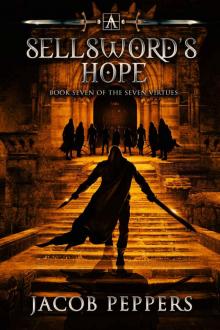 A Sellsword's Hope
A Sellsword's Hope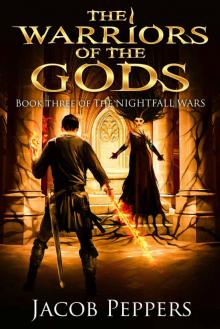 The Warriors of the Gods
The Warriors of the Gods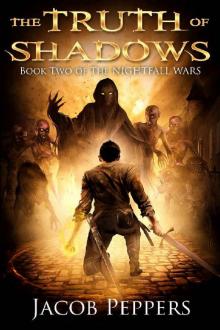 The Truth of Shadows
The Truth of Shadows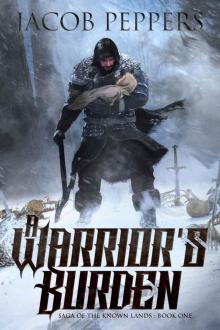 A Warrior's Burden: Book One of Saga of the Known Lands
A Warrior's Burden: Book One of Saga of the Known Lands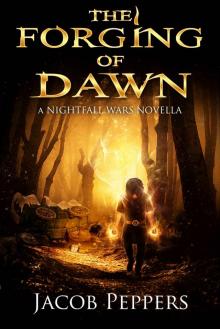 The Forging of Dawn
The Forging of Dawn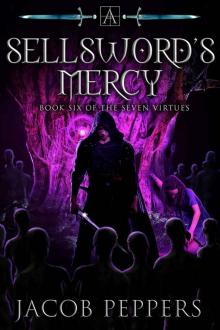 A Sellsword's Mercy
A Sellsword's Mercy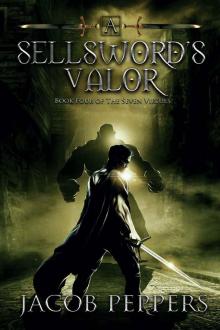 A Sellsword's Valor
A Sellsword's Valor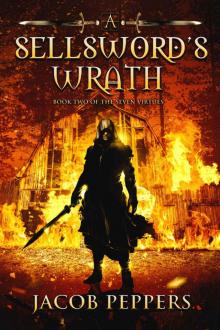 A Sellsword's Wrath
A Sellsword's Wrath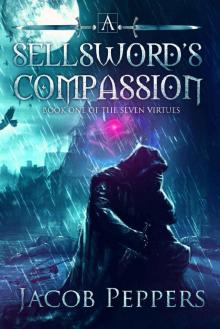 A Sellsword's Compassion_Book One of the Seven Virtues
A Sellsword's Compassion_Book One of the Seven Virtues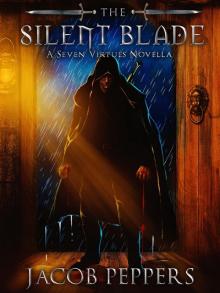 The Silent Blade: A Seven Virtues Novella
The Silent Blade: A Seven Virtues Novella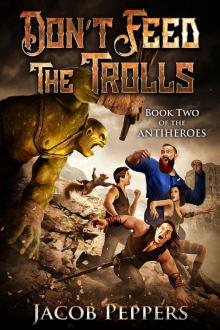 Don't Feed the Trolls
Don't Feed the Trolls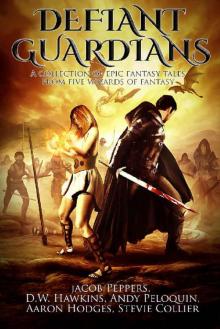 Defiant Guardians Anthology
Defiant Guardians Anthology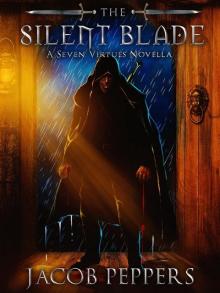 The Silent Blade
The Silent Blade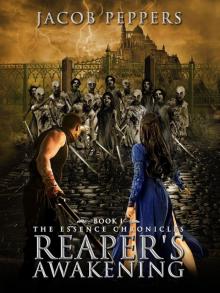 Reaper's Awakening
Reaper's Awakening